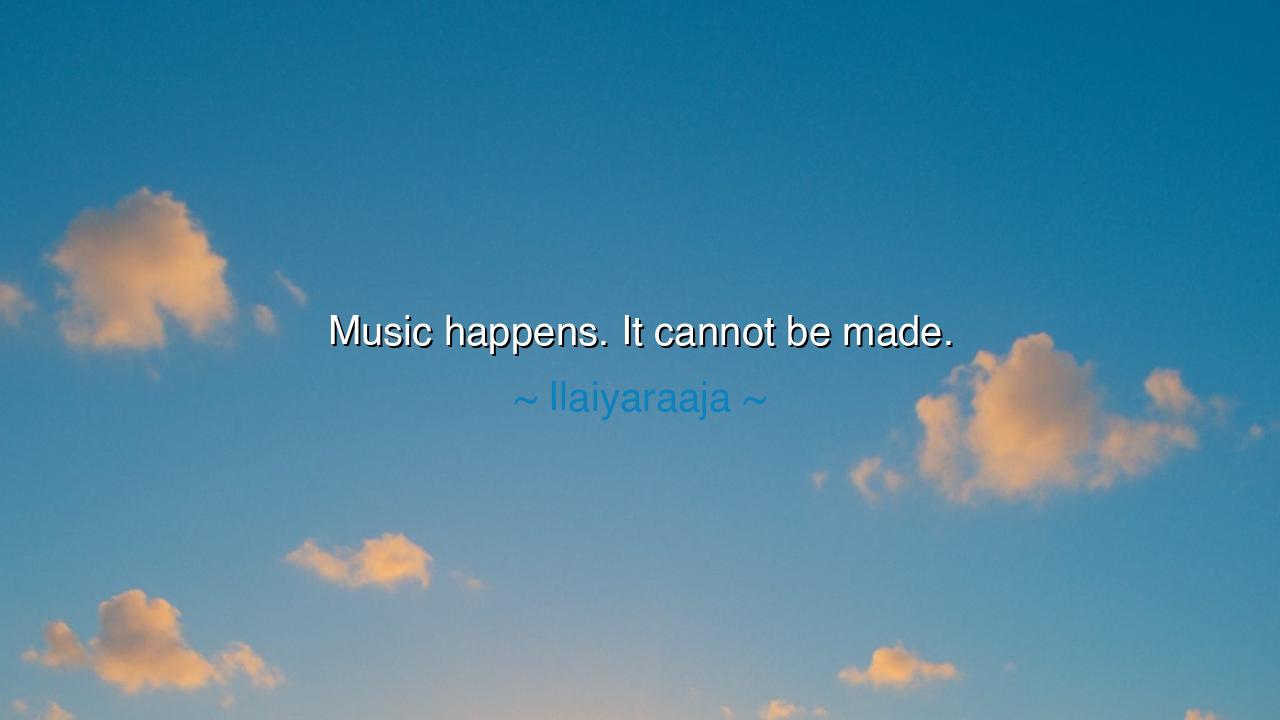
Music happens. It cannot be made.






Hear the words of the maestro Ilaiyaraaja, who proclaimed: “Music happens. It cannot be made.” At first, these words appear to defy reason, for do not men compose songs, write notes, and perform melodies? And yet, his statement touches upon a deeper truth—that music is not merely constructed by human will, but arises like a mystery, a river flowing from a source unseen. The artist is not the creator of music, but its vessel; not the master, but the servant of a force greater than himself.
To say that music happens is to acknowledge that true art is born in moments of inspiration, when the soul aligns with something eternal. A composer may labor, a performer may practice, yet the spark of life in music comes unbidden, as though descending from the heavens. The ancient Greeks called this the gift of the Muses, divine daughters who breathed song into mortals. Ilaiyaraaja, in his wisdom, gives voice to this same timeless belief: music is not forced—it is received.
History has shown us countless examples of this mystery. Think of Mozart, who spoke of entire symphonies appearing in his mind as if delivered whole. He did not "make" them, but merely wrote down what already existed within some higher realm of sound. Or recall Ravi Shankar, whose sitar performances seemed to draw the very breath of the cosmos into vibration. Their genius was not the product of mere craft, but the willingness to open themselves as instruments to something beyond.
And yet, the phrase does not deny the place of labor or discipline. One must train the hand, sharpen the ear, and discipline the mind. But technique alone produces lifeless notes; it is when the heart opens and the unseen enters that music happens. Thus, the great works of art are not simply "made" like tools or machines. They are born, breathed, and lived into existence. The artist is midwife to what already hovers in eternity.
This wisdom also carries a lesson for life itself. For life, too, is not merely "made" by careful planning or rigid design. It "happens," often in ways unexpected, mysterious, and profound. Just as music flows in moments unplanned, so too does love, insight, and joy. To live well is not to control all things, but to remain open, receptive, and present when the divine pulse of existence reveals itself.
The lesson, then, is clear: do not force beauty, do not strain to create meaning as though it were only your task. Instead, prepare yourself, discipline your craft, and keep your soul open. When the moment comes, when the river of music flows, let it move through you without resistance. In this way, you will find that what you bring forth is not manufactured, but alive.
Practical steps follow. Whether in art, work, or daily life, cultivate silence, for it is in silence that music happens. Train your skills, but do not let them harden you into rigidity. Be attentive to inspiration when it comes, and do not dismiss sudden sparks of thought or feeling. Most of all, recognize that creation is partnership between human effort and divine mystery—honor both, and your work will breathe with life.
Thus the words of Ilaiyaraaja endure: “Music happens. It cannot be made.” They remind us that true art, like true living, flows from beyond our control. Our task is not to manufacture it, but to receive it with humility, shape it with care, and offer it to the world as a gift. And in so doing, we become not just makers of sound, but vessels of the eternal harmony that sings through all creation.






AAdministratorAdministrator
Welcome, honored guests. Please leave a comment, we will respond soon